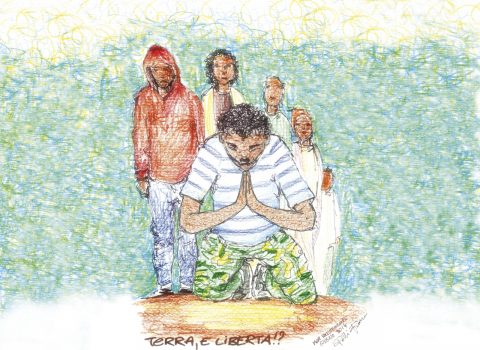Stories of (induced) marginality
The dynamics of reception produce illegality and vulnerability that push people to accept to be exploited
The events of recent weeks are not new in the nature of the facts, but their extraordinary aggressiveness shows a form that represents a new level: from hatred against the poor and migrants conveyed by words, we have moved on to physical violence, that not new either, but certainly made more legitimate than before. In early February in Macerata, a member of the neo-fascist right carries out a raid firing gunshots on all the black people who crosses his path, identifying in the color of the skin the element on which to create the distinction between “us” and “them”. Where “they”, the blacks, the enemies, are those to be punished for the murder of a Roman girl that occurred a few days earlier, for which a Nigerian pusher is suspected. The response of citizens will be heard on February 10 in Macerata with an anti-fascist demonstration of about thirty thousand people. But the climate is still poisoned: after a few days a user of Trenitalia recalls and somehow justifies the attempted massacre of Macerata in a post on facebook in which he comments the presence, on a Frecciarossa, the Italian high-speed train, of a black (not “colored”, we are colored as well) man without a ticket. A few hours later Trenitalia denied the story since the man actually held a ticket. But it was too late: the post had already gone viral, complete with photos of the alleged ticketless migrant, in violation of all privacy regulations.
The Facebook post of the alleged ticketless kid recalled to my mind the words of A., a 30-year old Sudanese I met in Ventimiglia. A. followed the path we described in our previous episodes: the arrival somewhere in the south, the transfer to a reception facility, the decision not to comply with the processing time and methods dictated by the Italian institutions, the nightmare of having to settle in Italy the attempt to cross the border through the Maritime Alps border in France. Here, A. is repeatedly stopped and brought back. During one of these transfers the money ends, just as he is deported to Taranto and wants to go back to Ventimiglia. The journey takes two days, taking different trains from which it is each time forced to get down because he didn’t have a ticket. He doesn’t eat and drinks very little water. He explains that he always keeps in mind the idea of having to maintain a calm attitude, to avoid possible contact with the police: A. is a cultured man, and he reflects very clearly on the figure of the migrant that is implicitly and mechanically seen as a criminal, and simply wants to avoid supporting it or suffering the consequences. However, he wishes at the same time to avoid resorting to sources of income he deems not very respectable and unacceptable from an ethical and, I would say, political point of view. He tells me that one of his countrymen, in his same situation, namely stuck in Taranto without money for the trips, had found work in the fields (Salento and the plains of Foggia are not so far from Taranto). A few euros a day, from which money for meals or transport was curtailed, for exhausting jobs. Few euros a day to leave the hotspot and face the road through the internal borders of Europe, which for those coming from third countries are firmly closed. A. tells me that he did not come to Europe to do those jobs.
He asks me why people are being transported across the country and then left without the resources to survive. Of course I don’t know what to answer, but I reflect with him on the role of the grocery collected by black arms, which end up in our supermarkets at very low prices for Italian families of all social classes. Yet their productive role so central from an economic standpoint, is accompanied by an enormous social subordination, an uncertain legal status and a powerful racism. At times, it seems indeed that precisely this socio-juridical status that pushes them to a lower level is what allows the conditions of them to be exploited in key sectors of our economy: agriculture, construction, personal care. A., however, decided to take other roads.
Once again the example shows how the structures and the dynamics of reception produce the illegality and the vulnerability that pushes people to resort to labor exploitation or to various forms of deviance, including not paying for public transport tickets. At the same time, however, this case shows how such marginality-producing apparatuses, which feed and rely on daily discriminatory discourses, are always to be positioned into a dialectic between power and resistance: A. partly escapes it by rejecting that place in society and aims directly to crossing the border, which for him represents reuniting with friends and relatives, imagining a future and creating stability. He follows his journey towards desire with determination, even if he does not have a ticket. It seems that the ticket can be used here as an object and as a metaphor: he does not have the ticket, i.e. the piece of paper needed to travel on trains, nor the ticket as a metaphor of the characteristics that make that journey harder: he is black, poor and is not from Europe. He therefore doesn’t have the possibility to pass those boundaries freely. I thought that A. could be that man on the train on his way to Ventimiglia or any other place that for him meant not freedom but justice.
The “European Migration Government” COLUMN is curated by OSVALDO COSTANTINI, an associate researcher at the Center for Religious Studies of Fondazione Bruno Kessler, which is involved in the lifestyle and conflicts research lines. Within this interest moves between scientific publications and public press releases, especially in relation to those aspects of the #migration more closely related to the imaginations, the desires, and the related frustrations and disillusionments that move the actions of these new “damned of the earth”.

